 Mustafa II, 1695-1703 the Ottoman Sultan Mustafa II, 1695-1703 the Ottoman Sultan Welcome Mary Wortley Montagu, born January 19, 1718! I have to say, giving birth wasn’t half as mortifying here as it is in England. No one bothers laying in for an entire month and I was up and visiting friends again in three weeks time!
Just a few days ago, I went to visit Sultana Hafise, the favorite kadin of the last Emperor, Mustapha, who was deposed by his brother and died shortly after (they think he was poisoned!). The Sultan then forced her to marry, even though she begged him not to make her as she had vowed she would never sleep with another man. To prove her point, when she was forced to choose, she picked the secretary of state who was over 80 years old. Beyond his age, she chose him because he was the one who brought her to the former emperor. She is still in mourning today and could not talk about him without tearing up...
She was quite beautiful, though not nearly as beautiful as Fatima. It was her dress was what really stood out. She wore a vest called a dualma, which has longer sleeves than the caftan. It was purple and lined with pearls, with large gold loops as buttons. The whole things was tied with two large tassels of smaller pearl and the arms were lined with diamonds. She had three long necklaces on, one of pearl with a an emerald as big as a turkey egg! Her earrings eclipsed everything else though—two pear shaped diamonds the size of hazelnuts. She had four strings of pearls each as large as the Duchess of Marlborough’s! And her rings were the largest diamond rings I’ve ever seen (except for Mr.Pitt’s of course).
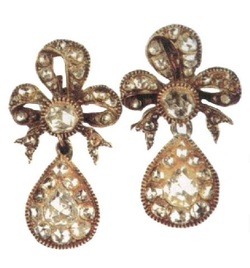 Not quite as nice as the Sultana's Not quite as nice as the Sultana's
but you get the idea! We had a beautiful dinner, and the display on the table was equally as lovely as her dress. The napkins were so nice; I didn’t even want to wipe my hands on them! After dinner, we had coffee in gold soucoupes. Her home was equally as richly decorated as the table. Even her servants were dressed in gold.
Now I know you’re going to say that this sounds made up, like I copied right out of the Arabian tales, but this is what I actually saw! We travel bloggers have a hard time, we we only say what’s been said before we’re boring, but if we say anything new, suddenly we’re exaggerating and romanticizing what we see, so much so that should I come home, I won’t even discuss what I’ve seen with anyone.
I went to see Fatima yesterday as well, and if you don’t believe my descriptions above, you’ll never believe what I’ve seen in her palace! The Sultana was nice, but the grace and manners of court come so naturally to Fatima, she immediately inspires respect and tenderness and now that I am learning her language and can talk to her, I find her wit equally as charming! The servant I had with me couldn’t believe she was a Turkish Lady and thought she must be a Christian (and as it turns out, her mother is). I had to tell her what a stir her beauty would cause in London! And she, in her infinite sweetness, replied that if England valued beauty as much as I say they'ed never have let me leave!
This blog is getting way too long, so I’ll stop here before a turn into a downright storyteller. It may be a proverb that knowledge is no burden, but knowing too much will still most likely make us troublesome to other people…
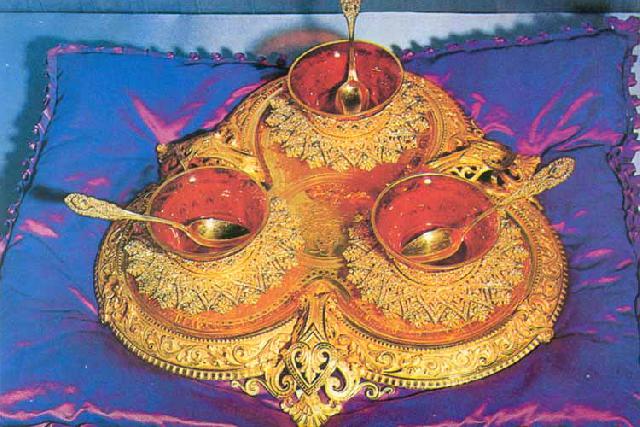 Gold encrusted with diamonds, composte service, Topkapi Museum.
Back in Pera, Constantinople. Not much of consequence to write about lately, as I’ve been preparing for the newest addition to our family! It’s a bit unnerving to be preparing for this so far from home, but mother’s here are so greatly respected that I can’t help but feel some of that respect myself. On the hand though, women without children are really looked down upon. It seems it's better to be an unwed mother than a married woman without children!
The women go to extremes to prove that they are not past childbearing age and often kill themselves in the process. In fact, all the women I’ve met who have been married 10 years have close to 12 or 13 children each and when they’re pregnant, they pray for twins. I asked some of my friends here how they can care for so many children, they simply explain that many are likely die before growing up (which I guess does happen often). But they don’t seem to care, giving birth is enough to satisfy their vanity. I’m afraid I will remain very English in this area…
But now that I’ve discussed what you want to read about, I have to brag a little about the beautiful weather! I'm quite fond of the climate: while you huddle next to your heaters at home, I’m sitting in the sun, feeling the warm breeze, and enjoying fresh cut flowers from the garden. I’m also quite fond of certain aspects of Turkish law. Here, anyone convicted of lying is burnt on the forehead with a hot iron. I wonder how many English “gentleman” would have to grow their hair out if we adopted this practice at home… ;)
I’d say more but I must go see the midwife!
I hope that you all have been getting my emails! The wifi has been iffy, though I did receive yours Mr. Pope, and you’ll be happy to know that, no, I am not dead and buried, although at times I feel I like I might as well be I care so little about what goes on at home. The heat of the city has driven us off to Belgrade Village, where I’m blogging from now. It’s very beautiful here and I feel so disconnected from what’s going on in the world I really might as well be a ghost. Although I do miss my friends, the things they tell me about home don’t excite me in any way and I can’t seem to care about the same old drama. As an admirable author once said:
That spirits departed are wondrous kind
To friends and relations left behind:
Which nobody can deny. [1]
Truth be told, I sometimes I really get tired of all the singing, and dancing, and sunshine (yea right) but I always try an persuade myself that I’m better off than you at home…
I spend my week reading English; studying the Turkish language, (which I am awesome at!) and classical authors; writing; sewing; seeing visitors, and listening to music-- a much better use of my time than, sitting drawing rooms and listening to all the same gossips and scandal, seeing the same follies acted over and over.
But of course, Mr. Pope, this apathy does not extend to you and I hope that you remember me, even though I'm dead to the world…Now, to my dear ladies, I'm sorry, but I can’t help but laugh at the outrageous things you're all are asking me! No, I will not be buying anyone a slave. The slaves kept here are brought up from a young age and very carefully educated to serve their ladies. Their patrons rarely sell them except as punishment for an extreme mistake, so they do not face the markets, and if they ever get tired of them, they give them to a friend or free them.
I know that this is not what you expect to hear and that the stories in England don’t sound like this at all, but you’ll have to take my word for it, because I’m here and I'm telling you the truth. All of you with your questions and assumptions are completely ignorant about what life is like here and it’s clear that you’ve derived your ideas from Dumont’s own ignorance. Really, reading these travel accounts is quite entertaining. They never fail to discuss women, which they definitely have not seen in their travels, speak of great men who they could never have gotten an audience with, and describe mosques which they were too afraid to even peep into.
Anyway…
I finally tried this Balm of Mecha (it’s hard to get but I’ll try and send some home soon!) and it made me break out like crazy! So be warned if you’re going to try it! Though, if we judge it’s effectiveness by the women here, it must be working; their skin is flawless.
Funny though, the women here seem to have quite a different way of getting noticed by men than looking good (which is what we do at home)—they pretend to have a magic, secret knowledge that gives them control over others. I couldn’t help but argue this point with one Lady, explaining that there’s no magic in a man playing the fool for a woman…but its no use, they all firmly believe in this power. Oh well, until next time!
The weather has been beautiful so far on our journey. The road was full of the great Sipahi, but nothing really happened worth relaying until we reached Ciorlu, where we lodged in a conac, or small seraglio. I did some serious exploring of all the women's apartments here, which are in the middle of a thick copse of trees, and found the walls to be covered with poetry, written by the women, little distiches penciled in by hand. 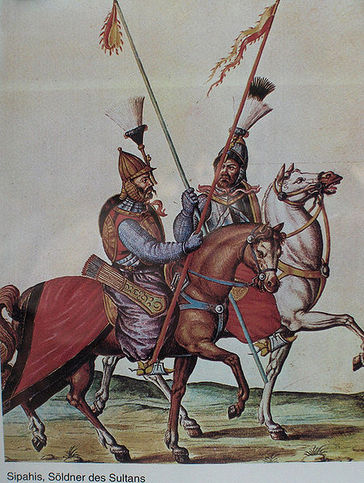 Sipahi at the Battle of Vienna, 1642 As we rode on we passed an ancient Greek church, which seemed pretty poorly built and less richly decorated than the Roman Catholic church, but the most celebrated Madonna in Italy could not be more famous for her miracles than this church!
We stayed that night at Bujuk Cekmege, or Great Bridge; and the next, at Kujuk Cekmege, or Little Bridge. We stayed in a former monastery that now belongs to a hogia or schoolmaster. I asked him to show me his own home, and he pointed to a treehouse he had built for himself and his family at the top of tall cypress! I wanted to take a closer look, but realized I'd probably break my neck on the climb.
Finally, we made it to Constantinople the next day; but I haven't had much time for exploring yet –I've had so many visits to make over the last few days. We are staying in Pera, (which is no more a suburb of Constantinople, than Westminster is a suburb to London). 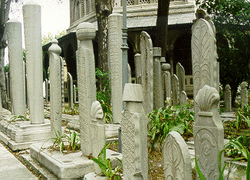 Cemetery on the grounds of the Cemetery on the grounds of the
Süleymaniye mosque A certain French author says, Constantinople is twice the size of Paris. Mr W—— is claims its no bigger than London, though it looks bigger to me, but maybe not quite a populated. The cemeteries themselves are larger than the entire city, I've seen some a few miles long. No graves are ever moved and so land the size of villages becomes devoted to burying the dead. For each grave a pillar is set up and a turban indicating the profession or position of the person is carved into the top. Women have a simple pillar with no carvings or decorations, except those that died unmarried who have a rose at the top of the pillar.
When I wrote earlier about religion, there were a few things I forgot to mention but I wanted to discuss now because they seemed a little unbelievable to me. First, did you know that when a man divorces his wife he can get her back (legally) by simply permitting her to sleep with another man? I know some people who actually choose to do this rather than loose their love entirely. Second, I've learned that a woman who dies unmarried is believed to die in a state of reprobation. As a woman's purpose is to create and multiply, she is only doing what God expects when she is having or taking care of children. Of course, our vulgar misconception that they believe women do not have souls if completely false, though women's souls are seen as inferior to men’s and unable to get into the same paradise reserved for them. There is a “place of happiness” dedicated entirely to the souls of the inferior where all good women may have eternal bliss. Many of the women are superstitious and are afraid to remain a widow for more a week for fear of dying in a useless state. Those that enjoy being free of a husband and are not as strict in their beliefs, just wait and marry when they start to become afraid of dying. This seems very different than the idea that nothing is more acceptable to God than a vow of constant virginity. I'll let you decide which is more traditional...
I can't tell you anything else yet, but once I've done some exploring, you'll hear from me!.
I plan on telling you all kinds of new stuff about this place! What will surprise you most is the way I look though…being in my Turkish clothing and all. I’ll attach a photo of myself! The first part of my dress is a pair of drawers that reach to my shoes and conceal my legs more modestly than your petticoats. They are a rosy color, brocaded with silver flowers. My shoes are white and embroidered with gold. Over this hangs my white silk gauze, edged with embroidery. The smock has wide sleeves that hang down my arm and is closed at my neck with a diamond button, but the shape and color of the bosom can be distinguished through it! The antery is a white and gold fitted waistcoat with very long sleeves falling back and fringed with deep gold fringe and have either diamond or pearl buttons. My caftan is also fitted to my body and reaches my feet, with very long sleeves. Over all of this is the belt, about four fingers wide, which is entirely made of diamonds and other gorgeous stones. Now depending on the weather, the curdee is a loose robe they throw on, made of a rich brocade (mine is green and gold) and lined with ermine or sables. The sleeves just barely reach below the shoulders.
The headdress is composed of a cap called talpock, which is made of fine velvet with pearls or diamonds in the winter, and of a light shinning silver stuff in the summer. The talpock is fixed on either side of the head that hangs a little ways down with a tassel that’s bound with a circle of diamonds or a richly embroidered handkerchief. On the other side of the head, the hair is laid flat and depending on individual taste, some ladies put flowers, feathers, or whatever they want; usually though, the ladies wear a large bouquet of jewels made to look like flowers, i.e. pearls, roses of different colored rubies, the jessamines of diamonds, jonquils or topazes, etc. Their hair hangs at its full length behind, divided into many tresses and braided with lots of pearls or ribbons!
It would be so surprising to find a woman who isn’t beautiful around here. They have the prettiest complexions in the world and generally large black eyes. The court of England does not have as many beauties as there are here. Generally, the ladies shape their eyebrows, and wear a lot of eyeliner so that at a distance, it adds very much to the blackness of them. They also paint their nails a rose-color, which I personally don’t like.
Now that I am a little more familiar with the customs in Turkey, I cannot but think of how extremely stupidity of all the writers were that gave accounts of the Turkish women. It’s so clear that these women have more liberty than we do. No woman, regardless of her rank, leaves the house without two muslins, one that covers her face but reveals her eyes, and another that hides her head and hangs half way down her back. They also cover their body shapes with a thing they call ferigee, which no woman appears without. This disguises them so that there is no way you can distinguish a great lady from her slave and no man dares to either touch or follow a woman in the street.
This masquerade allows them to do anything they want without getting discovered. So, you can imagine that not many wives are faithful in a country where they have nothing to fear from their lovers’ indiscretion. They don't have to worry about their husbands either; if they get a divorce, the rich ladies keep all of their money and property, and in addition, the husband is required to pay them. All in all, the Turkish women are the only free people in the Empire.
It’s true that the law allows men to have four wives, but a good man is not going to use that liberty and a woman of rank will definitely not tolerate it. If a man is unfaithful, he will keep his mistress in another house, just like the men in England do. Of all of the great men I know here though, only the Tefterdar keeps a few she-slaves and he has the reputation of a womanizer. Oh, and his wife lives with him but won’t see him ;)
All in all, people are not so different from one another as our travel bloggers would have us think. It would probably be more entertaining to make up some of my own customs but nothing is more pleasant than the truth.
|
 Mustafa II, 1695-1703 the Ottoman Sultan
Mustafa II, 1695-1703 the Ottoman Sultan  Not quite as nice as the Sultana's
Not quite as nice as the Sultana's 


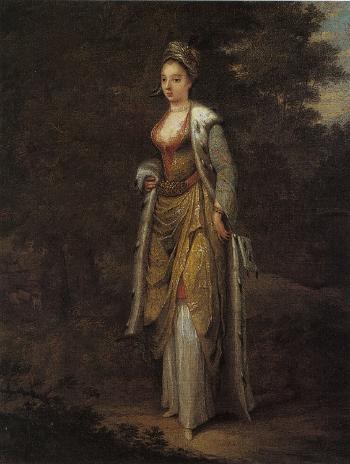
 RSS Feed
RSS Feed